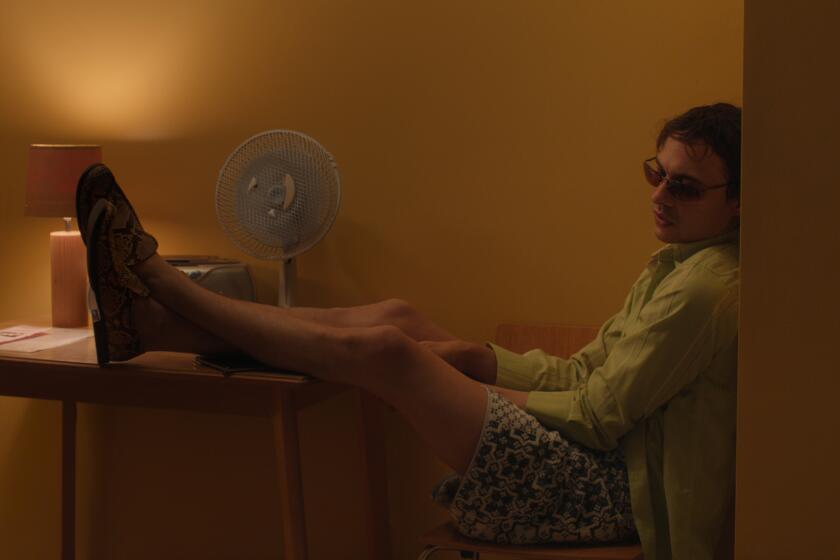The Sunday Conversation: Gael García Bernal
- Share via
In the film “Even the Rain,” Spain’s unsuccessful Oscar entry, Gael García Bernal, 32, plays a director filming a period drama about Spain’s conquest of Latin America in Bolivia during the 2000 demonstrations there against the privatization of water.
Your character in “Even the Rain,” the director of a film within a film, is a frustrated idealist. Do you relate to him?
No.
You’re not an idealist or you’re not frustrated?
I’m not frustrated, no. Because it’s an oxymoron in a way, a frustrated idealist — at the end of the day, idealism is everything but frustration. It’s something that keeps happening and keeps evolving and keeps you on a road going somewhere. And there might be a conflict when an idealist becomes frustrated, but I don’t think you can be a frustrated idealist in a sense. You get frustrated by other things, but you can always be an idealist, of course. If I were to say whether I was an idealist or not, I would say, yeah, I think I am. If I were to say I’m not an idealist, it would be very grim, with a lack of a future.
How did you get involved in the film?
I was just called to be part of it, and it was fun to be able to get close to playing a director. To play a film director in a movie, in a way, is something you rarely get a chance to do. And it’s a great opportunity to do something that is a bit self-referential as well — my experience with friends, other directors I’ve worked with or about me directing; it’s something that’s not so far away.
You directed a film in 2007, “Deficit.”
Yeah, it ended up being a film, but it was an experiment. It was a video thing we did with a few friends, and whilst doing it, we started to put some rigor into it for it to become a film. And at the end of the day, we came out with a film, which was nice to come out with that. But we saw it much more as an experiment to play with the language of filmmaking, rather than making a movie.
You made that with your production company, Canana. What does that mean?
It is a belt where the revolutionaries kept their ammunition.
There’s some consistency between your work in “Even the Rain” and Canana Films, which specifically deals with themes of social justice in Mexico and Latin America.
Everything related to Latin America has a political complexity, no? It’s a very politicized place. I would argue that whatever you do wherever, it’s very politicized, but I think in Latin America it’s particularly politicized. So you can’t escape from the politics of it all. And the good thing is it’s a great, very rich context that you can use to your benefit in the film, in the story.
What else have you been doing with Canana?
Many things — many films and we have a documentary film festival that travels around Mexico and goes to different cities. It’s been six years now that Canana has been happening. I don’t know how many films we’ve done, quite a few — some bigger, some smaller. Some theater as well.
You’ve been political since you were very young. What’s your earliest memory of being politically active?
There is no division, actually, in my upbringing in Mexico, where politics are totally there. Especially when we were kids, there was the PRI [Institutional Revolutionary Party] in power and the elections came and there was a big fraud and then there were other elections and the PRI was taken down. It’s very alive politically here. People are very engaged. So I won’t see myself as an exception or something singular.
Do you remember the Bolivian water demonstrations that “Even the Rain” depicts?
Yes, absolutely. It was in the year 2000, and it was very memorable because it was one of the first sparks or signs of revolution that eventually brought down the government in Bolivia. And it was the beginning of the rise of Evo Morales [who became president of Bolivia in 2005]. This thing, like in the film, was also a very abusive circumstance, what was happening, and Bolivia has been the best example of the exploitation that happens, not only in Bolivia but in Latin America. It was very, very memorable and like a pinnacle of some kind of change that later sparked in Latin America and in the world, I would say, because people really, in a way, won against the big corporation and that’s very seldom.
It looks like you have some Hollywood films coming up. “A Little Bit of Heaven”? You play a nice Jewish doctor and you’re Kate Hudson’s love interest?
(Laughs) Yeah.
Are you making more of a push in English-language movies?
I wasn’t resisting as much, because there hasn’t been much opportunities or invitations to do films like that. So it hasn’t been resistance. Also, it’s just fun to go ahead and do it without making a big issue out of it. It’s a good experience to have and it’s a great privilege to be invited as well, to have a job. It’s a fun thing to do and every experience, as ambitious or easy as it may look, you learn.
I wonder why you haven’t gotten bites before this. Hollywood has been aware of you since “Amores Perros” came out in 2000. I wonder why now.
Yeah, I wonder as well.
More to Read
The biggest entertainment stories
Get our big stories about Hollywood, film, television, music, arts, culture and more right in your inbox as soon as they publish.
You may occasionally receive promotional content from the Los Angeles Times.










